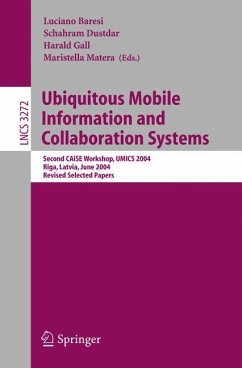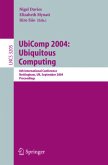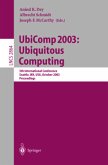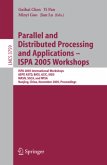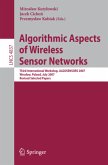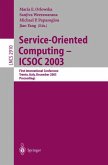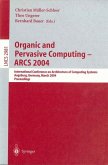This book constitutes the thoroughly refereed post-proceedings of the Second International Workshop on Ubiquitous Mobile Information and Collaboration Systems, UMICS 2004, held in Riga, Latvia in June 2004 as a CAiSE satellite workshop.
The 13 revised full papers presented together with an invited paper were carefully selected during two rounds of reviewing and improvement. The papers presented are related to fields such as workflow systems, groupware and CSCW, event-based systems, software architecture, distributed database systems, mobile computing, ubiquitous information systems, peer-to-peer systems, etc. The papers are organized in topical sections on data and context management, coordination and control process modeling, and application frameworks.
Over recent years most business processes have changed in various dimensions (e. g. , ?exibility, interconnectivity, coordination style, autonomy) due to market conditions, organizational models, and usage scenarios of information systems. Frequently, inf- mationisrelocatedwithinageographicallydistributedsystemaccordingtorulesthatare only seldom de?ned as a well-codi?ed business process. This creates the need for a so- ware infrastructure that enables ubiquitous mobile and collaboration systems (UMICS). The anywhere/anytime/any means paradigm is becoming the major challenge in conceiving, designing, and releasing next-generation information systems. New te- nologies, like wi-? networks and 3rd-generation mobile phones, are offering the infr- tructure to conceive of information systems as ubiquitous information systems, that is, systems that are accessible from anywhere, at any time, and with any device. Ubiquity is not yet another buzzword pushed by emerging technologies, but is mainly a means to support new business models and encourage new ways of working. This new wave of UMICS will exploit the knowledge developed and deployed for conventional infor- tion systems, but will also need new concepts, models, methodologies, and supporting technologies to fully exploit the potentials of the enabling infrastructure and to be ready for the challenge. Moreover, people need to move across organizational boundaries and collaborate with others within an organization as well as between organizations. The ability to query the company's distributed knowledge base and to cooperate with co-workers is still a requirement, but mobility brings new access scenarios and higher complexity.
The 13 revised full papers presented together with an invited paper were carefully selected during two rounds of reviewing and improvement. The papers presented are related to fields such as workflow systems, groupware and CSCW, event-based systems, software architecture, distributed database systems, mobile computing, ubiquitous information systems, peer-to-peer systems, etc. The papers are organized in topical sections on data and context management, coordination and control process modeling, and application frameworks.
Over recent years most business processes have changed in various dimensions (e. g. , ?exibility, interconnectivity, coordination style, autonomy) due to market conditions, organizational models, and usage scenarios of information systems. Frequently, inf- mationisrelocatedwithinageographicallydistributedsystemaccordingtorulesthatare only seldom de?ned as a well-codi?ed business process. This creates the need for a so- ware infrastructure that enables ubiquitous mobile and collaboration systems (UMICS). The anywhere/anytime/any means paradigm is becoming the major challenge in conceiving, designing, and releasing next-generation information systems. New te- nologies, like wi-? networks and 3rd-generation mobile phones, are offering the infr- tructure to conceive of information systems as ubiquitous information systems, that is, systems that are accessible from anywhere, at any time, and with any device. Ubiquity is not yet another buzzword pushed by emerging technologies, but is mainly a means to support new business models and encourage new ways of working. This new wave of UMICS will exploit the knowledge developed and deployed for conventional infor- tion systems, but will also need new concepts, models, methodologies, and supporting technologies to fully exploit the potentials of the enabling infrastructure and to be ready for the challenge. Moreover, people need to move across organizational boundaries and collaborate with others within an organization as well as between organizations. The ability to query the company's distributed knowledge base and to cooperate with co-workers is still a requirement, but mobility brings new access scenarios and higher complexity.

